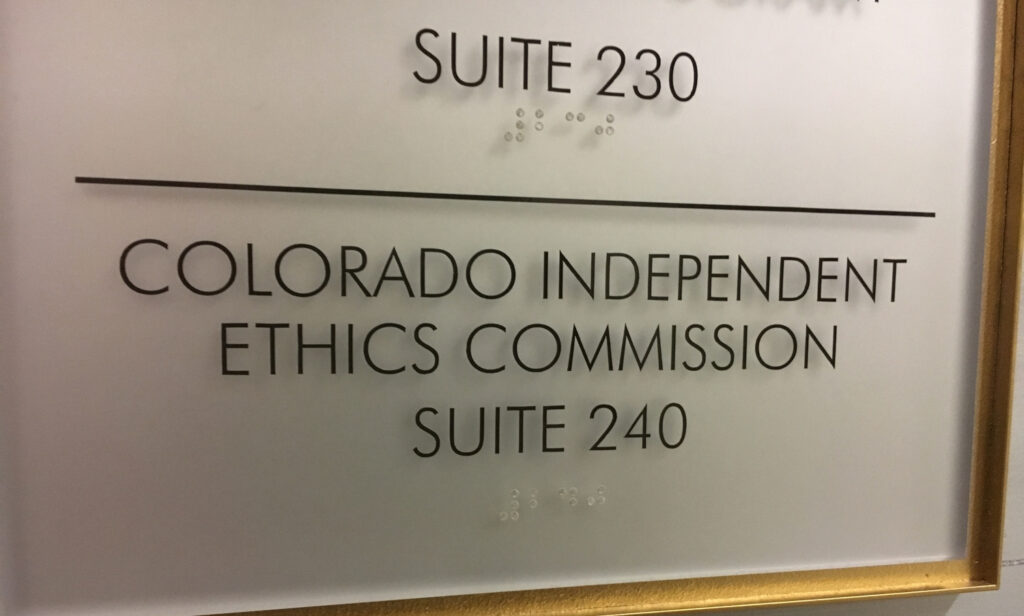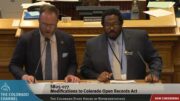Update: The new IEC records and meetings rules went into effect June 1, 2022.
By Jeffrey A. Roberts
CFOIC Executive Director
The constitutionally created state commission that investigates allegations of ethical misconduct by public officials should align proposed new procedural and records rules more closely with Colorado’s open-government laws.
That’s what the Colorado Freedom of Information Coalition, Colorado Common Cause and the commission’s former executive director say in critical written comments submitted to the Independent Ethics Commission at the end of December.
While the ethics commission “is an atypical public body, created by the Colorado Constitution, we maintain that there is no specific functional reason why the IEC should be treated differently from any other state or local ‘agency’ or ‘instrumentality’ when it comes to public accountability and transparency,” wrote CFOIC President Steve Zansberg in a Dec. 28 letter.

“If anything,” he added, “the role played by the IEC — as a truly independent watchdog passing judgment on the actions of other governmental bodies and public officials — requires that its records and meetings be subject to even greater public access than any other governmental office.”
The IEC’s goal in promulgating the new rules “seems to be to make its activities less transparent and make its processes and procedures more cumbersome and difficult for the average citizen to navigate,” wrote Jane Feldman, the IEC’s executive director from 2008 to 2014. A third letter from Common Cause Associate Director Cameron Hill says the proposed rules “limit transparency and public oversight.”
In 2020, the Colorado Court of Appeals determined that the IEC is not a state agency subject to the Colorado Open Records Act (CORA) or the Colorado Open Meetings Law. To be subject to CORA, an entity must be an agency, institution or political subdivision of the state, and the IEC is neither an agency nor an institution, an appellate panel ruled. And because the IEC is not a state agency, it falls outside the scope of the open meetings law, which covers public bodies within state agencies, the Court of Appeals said.
The ethics commission adopted its own records access policy in 2018, incorporating CORA with some exceptions and additions, and is now considering a revised set of rules for the way it operates and allows public access to its records and proceedings. The commissioners are scheduled to consider the written comments at their Feb. 15 meeting.
Zansberg and Feldman noted that, unlike CORA and the open meetings law, the proposed new rules do not provide a way for the public to appeal a denial of access. “Even more egregious than the substantive shortcomings of the proposed Rule … is the complete lack of any procedural mechanism by which any citizen or resident of the State can challenge the IEC’s interpretation and application of its own rule,” Zansberg wrote.
Feldman, who serves on the Denver Board of Ethics, pointed out that the proposed IEC rules “generally provide that a public record is what the IEC says it is, and that only public records will be disclosed. Similarly, an Open Meeting is one in which the IEC discusses what it wants to discuss in open session. This circular reasoning is problematic. The insistence on secrecy undermines the public’s confidence in the operations of the IEC.”
The treatment of IEC personnel records is “one obvious, concrete example” of how the proposed rules fall short of the standards in CORA, the CFOIC comments say. The personnel files of IEC employees are “non-public records,” according to the rules, except for records of sexual harassment complaints that result in an internal IEC investigation and the IEC’s general employment policies.
Zansberg noted that CORA’s personnel files exemption, as interpreted by judicial decisions, is narrowly limited to a public employee’s “personal demographic information,” such as home address, phone number and financial information.
Hill criticized the rules’ definition of non-disclosable work-product records as “overly broad.” The provision on IEC meetings, he wrote, “would give commissioners the authority to discuss official business related to pending complaints or advisory opinions in a commissioner’s basement or at a local pub, with no record of what was discussed or decided. We strongly oppose this and urge the commission to adopt rules that are in line with the Colorado Open Meetings Law or have even stricter guidelines.
“In order to maintain institutional integrity, the IEC must have the public’s trust. Operating with transparency is critical to earning and maintaining that.”
Follow the Colorado Freedom of Information Coalition on Twitter @CoFOIC. Like CFOIC’s Facebook page. Do you appreciate the information and resources provided by CFOIC? Please consider making a tax-deductible donation.




